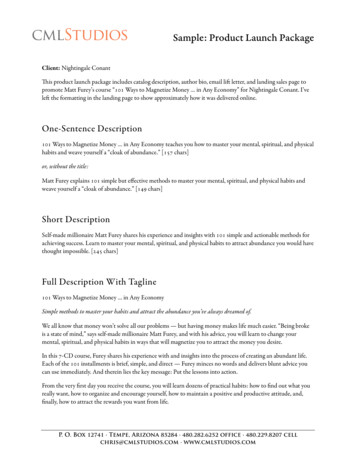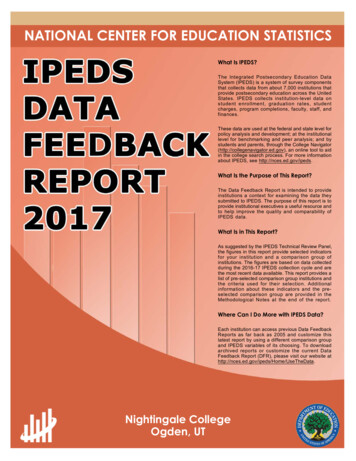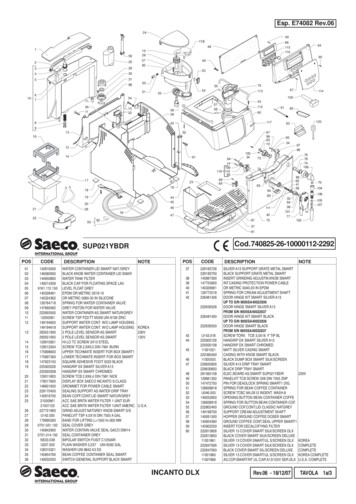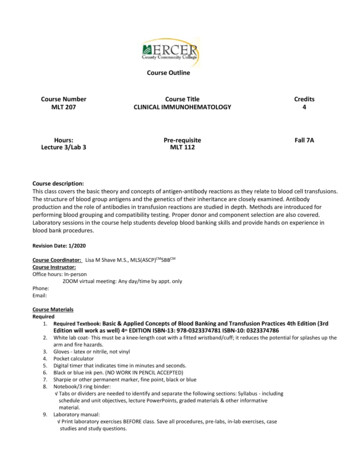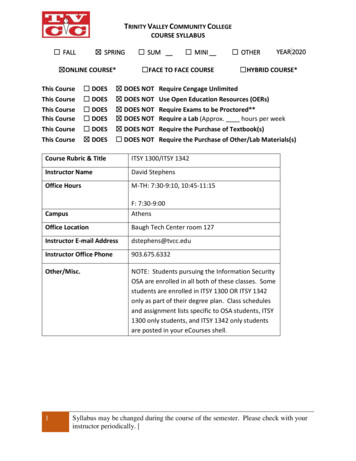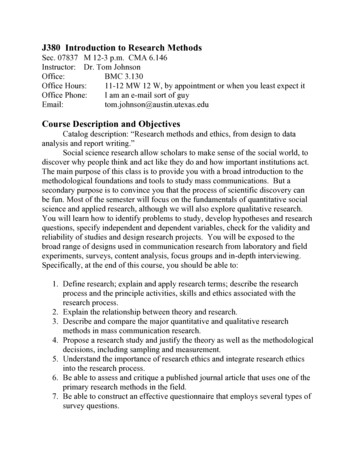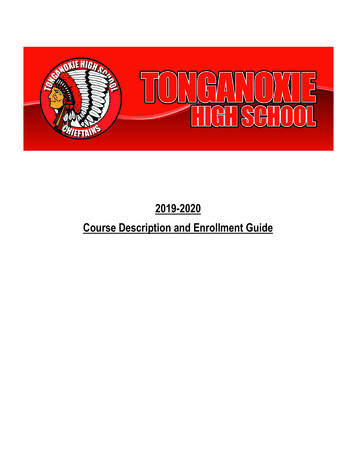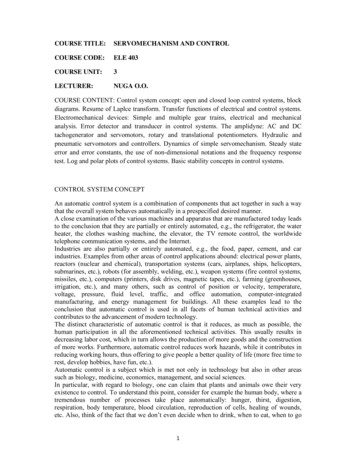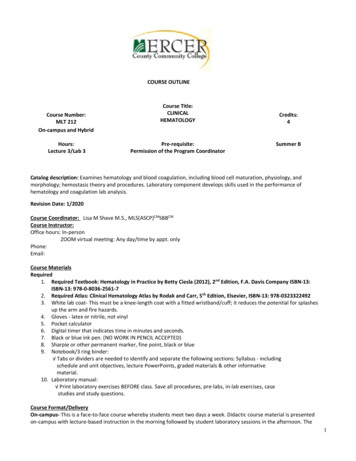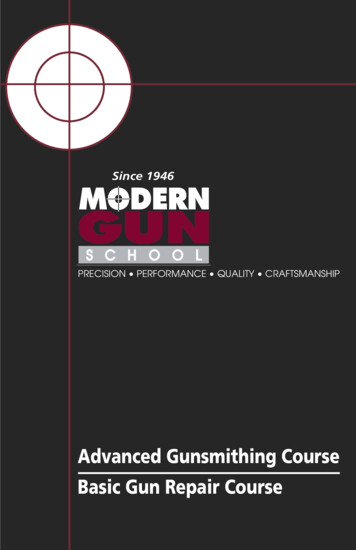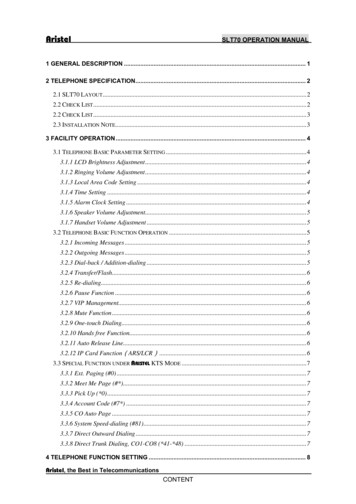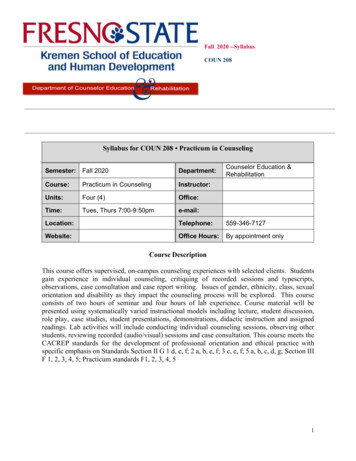
Transcription
Fall 2020 --SyllabusCOUN 208Syllabus for COUN 208 Practicum in CounselingSemester: Fall 2020Department:Course:Practicum in CounselingInstructor:Units:Four (4)Office:Time:Tues, Thurs 7:00-9:50pme-mail:Counselor Education ite:Office Hours:By appointment onlyCourse DescriptionThis course offers supervised, on-campus counseling experiences with selected clients. Studentsgain experience in individual counseling, critiquing of recorded sessions and typescripts,observations, case consultation and case report writing. Issues of gender, ethnicity, class, sexualorientation and disability as they impact the counseling process will be explored. This courseconsists of two hours of seminar and four hours of lab experience. Course material will bepresented using systematically varied instructional models including lecture, student discussion,role play, case studies, student presentations, demonstrations, didactic instruction and assignedreadings. Lab activities will include conducting individual counseling sessions, observing otherstudents, reviewing recorded (audio/visual) sessions and case consultation. This course meets theCACREP standards for the development of professional orientation and ethical practice withspecific emphasis on Standards Section II G 1 d, e, f; 2 a, b, e, f; 3 c, e, f; 5 a, b, c, d, g; Section IIIF 1, 2, 3, 4, 5; Practicum standards F1, 2, 3, 4, 51
PrerequisitesThis course is open to Masters in Counseling degree and PPS students only. Students must havesuccessfully completed COUN 200 with a grade of "B" or better.Course Objectives and Learning Outcomes (CTC 4, 6, 18 Introduction and Practice)The goal of this course is to support students in developing strong professional identity throughconducting and reflecting upon their counseling practices. By the end of the course studentsshould be able to:1. Demonstrate basic and advanced counseling skills during individual counseling sessionsincluding the ability to establish therapeutic counseling relationships, design effectiveintervention strategies, evaluate outcomes, and conduct effective termination of counselingrelationships with diverse clients.2. Assess the counseling process and themselves as counselors through engaging in a series ofactivities: providing individual counseling, writing reflection journals, and evaluating their ownmicro-counseling skills and core-conditions implemented in each counseling session (CACREPII.G.5.c).3. Apply theory to practice while counseling clients from diverse backgrounds (CACREP II.G.2.af, 3.e, 5.d).4. Engage in peer-evaluation through observing and critiquing the counseling sessions lead by yourpeers and providing constructive feedback on the strengths and weaknesses of counselingsessions you observed (CTC #4 and #31).5. Understand and apply the legal and ethical principles that govern the counseling profession asprescribed by the American Counseling Association (ACA) and related entities (CACREPII.G.1.j; CTC # 6 and #18).6. Recognize and seek consultation (with instructor) when confronted with “crisis”, "safety,""legal" and "ethical" issues presented by their client(s).7. Write progress notes and case reports that are clear, comprehensive and accurate.8. Learn about counseling theories and interventions that could support clients in resolution of suchissues (e.g. promoting persistence among first generation students, teaching healthy ways to copewith depression, stress management etc.).9. Expand their capacity to embrace and appreciate diversity through receiving opportunities toconnect with college students who might be different than themselves in relation to gender,sexual orientation, ethnicity, religion etc. in a more genuine and meaningful manner.10. Incorporate social justice and multicultural counseling concepts in counseling sessions.11. Demonstrate self-care strategies appropriate to the counselor role (CACREP II.G.1.d).12. Reflect upon the ways in which providing counseling transformed their current perspectives,biases, stereotypes, and sense of “self”.13. Translate the learning gained from engaging in individual counseling sessions to the areas oftheir specializations and clients they aspire to serve in future.2
CTC Standards (Introduction)This course develops and assesses students for the PPS-School Counseling Credential inaccordance with the following CTC Standards:CTC #2: Understanding of the effects of language, cultural variables, diversity, socioeconomicstatus, and factors of resiliency.CTC #3: This course provides experiences directed toward the improvement of student’s abilityto communicate with clients of all ethnic, racial and cultural diversity groups and be involved inthe necessary activities toward solution of identified problems.CTC #4: The abilities of students to assess a client, the counseling process, and themselves ascounselors are developed in this course through a series of activities: providing individualcounseling, observing and critiquing of peers in counseling, critiquing of tapes, writing reflectionjournals, and writing reports and progress notes on counseling sessions.CTC # 6 and # 18: Students will understand the professional code of ethics of ACA and be ableto incorporate those ethical standards into the counselor’s behavior.CTC #8: Students are supervised, on-campus counseling experiences with selectedclients. While students work on developing their counseling skills, they are also helped to gainunderstanding of how their own self-concept and issues may influence their counselingcompetence. This is accomplished through receiving feedback from instructors and peers,reviewing tapes of their counseling sessions, and maintaining a personal journal throughout thesemester. These journals are designed to help students gain insight into themselves and whatpersonal characteristics facilitate and/or hinder their counseling abilities. Students write reportssummarizing their assessment and understanding of the client's self-concept, world-view, natureof concerns, and decision-making behaviors.CTC # 11: Students demonstrate an understanding of learning theories and factors influencinglearning and teaching including emotional state, motivation and organizational skills.CTC # 14: Students will demonstrate self-awareness, sensitivity to others, and skillfulness inrelating to individuals and groups.CTC# 16: Students demonstrate knowledge of models of supervision used to mentor preprofessionals in practica and field experience placements.CTC # 18: Professional identity is developed through conducting counseling services in thecapacity of a counselor and reflecting on their practices.CTC #21 Students know the theories, concepts, processes, skills and practices required forsuccessful personal and social development.CTC # 23: Candidates demonstrate skills and attitudes essential for advocating for the learningand academic success of all pupils.CTC #25: Candidates know community-based mental health referral resources and effectivereferral practices.CTC #27: Students demonstrate collaborative competence in coordinating the services ofcommunity members, agency personnel and parents within a comprehensive school counselingand guidance program as it relates to the educational mission of the school.NCATE 1.6 Professional DispositionsThis course supports the development of the following professional dispositions among students:critical thinking, professional ethics, valuing diversity, collaboration, and life-long3
learning. Students will demonstrate these dispositions through their class discussions, writtenassignments, and case studies. Students will be given feedback on their development of thesedispositions as an ongoing process and through a written evaluation sheet at the end of thesemester.Required Texts1. Handbook for COUN 208: Practicum in Counseling (available on Canvas).2. Copy of ACA or CAMFT Ethical Guidelines (available on Canvas).Recommended Texts1. Ivey, A. E., Ivey, M. B., & Zalaquett, C. P. (2013). Intentional interviewing and counseling:Facilitating client development in a multicultural society (8th Ed). Pacific Grove, CA:Brooks/Cole.2. Yalom, I. D. (2002). The gift of therapy: An open letter to a new generation of therapists andtheir patients. New York: HarperCollins. MLA Citation.3. Jongsma, A.E., Peterson, M.L., & McInnis, W. P. (2000). The adult psychotherapy treatmentplanner. John Wiley & Sons: New York.Course Requirements*Liability Insurance:Students automatically purchase malpractice insurance through the university (written by Lloyd'sof London) by their registration in this class; unfortunately, you are not a "named insured" andyou do not get a policy in your hands. The faculty recommends (and many placements demand)that students have their own insurance, which comes with a policy face sheet with YOURNAME on the policy. Malpractice insurance is available through ACA, AAMFT, and/orCAMFT (and probably others, too). Since some of you are pursuing the MFCC Degree (and thelicense in California), you are strongly encouraged to examine the CAMFT program for yourindependent insurance (it will be something you will carry during your career.) Note: ACA,AAMFT, and CAMFT are professional counseling organizations that could strengthen yourprofessional identity and expertise as counselors and therapists apart from providing liabilityinsurance.*Adhere to the ACA or CAMFT Code of Ethics and Standards of Practice:Practicum students must uphold a high degree of professionalism at all times when working withclients. This includes knowledge of the ACA and CAMFT ethical code and the applicable lawsin California. Also read section entitled “Professional Behavior” in the Handbook (CACREPII.G.1.j). Located on Canvas.*Individual Counseling and Digital Recording: All counseling sessions will be recorded.Students should purchase a new encrypted 4GB Flash Drive that is USB 2.0 compatible foruploading the recorded sessions. Digital recordings are to be treated with the highest level ofconfidentiality. Students are responsible for destroying all recorded information at the end of the4
semester. Counseling sessions are to remain confidential in accordance with ACA’s Code ofEthics. Students should review each recording in a confidential setting and use them for selfassessment and session notes. On occasion, students may be required to submit recordings forreview and feedback from the instructor. In keeping with practicum policy, students shouldensure clients have signed the informed consent form, which includes notification that sessionrecordings are to be used for supervisory and educational purposes, prior to beginningcounseling. (CTC 2, 3,4,5,10, 18, 25 practice); (NCATE 1.2, 1.5, 1.8, 4)*Evaluations:Apart from providing students on-going supervision, Instructor will meet students to discusstheir mid-term and final evaluations based on the evaluation templates provided by theCounselor Education Program. (CTC 2, 3, 4, 6, 8, 14, 18, 25 assessment)*Triadic and Group Supervision:Students will participate in triadic supervision about their specific counselingconcerns and issues that may enhance or compromise therapeutic relationshipand/or counseling skills for an average of 1 hour of individual/triadic supervisionper week. Students will participate in group supervision approximately 2 hoursper week. (NCATE 1.2, 1.5, 1.8, 4) (CTC 2, 5, 10, 11, 14, 16, 23, 25, 27assessment)*Attendance: (30 points)It is extremely important you do not miss sessions and supervision. If your absence isunavoidable, you are responsible for contacting your clients in a timely manner (at least 24 hoursin advance) and notifying your instructor, through email and/or phone. Unannounced absencesare considered “unethical conduct”, and could result in a failing grade in the course. Youare allowed to miss 2 class days without any academic impact. After 2 missed class days, your gradeautomatically drops one letter grade. Your attendance is essential for this class.*Student Progress Folders: (10 points)Students will maintain a Progress Folder which includes: Time Logs, Mid-Term Evaluation,and Final Evaluation along with all documentation and records. Student progress folders willbe evaluated by the instructor. (CTC 4 assessment); (NCATE 1.2, 1.5, 1.8, 4).Following material must be placed in progress folder regularly:Time LogsStudents are required to complete a Time Log, which include: Counseling Time Sheets,Observation Time Sheets, and Supervision Time Sheets (See forms in Handbook,Canvas). These will be turned in at the last class meeting. Students are also required tocomplete the Proof of Sessions Form as needed for clients, and to give them to the clientsat their final sessions. MFCC students who are continuing on to COUN 238 are requiredto make a copy of their time logs and submit to COUN 238 instructor.*Client Sessions Folder: (30 points)5
Students are required to maintain a folder with clients’ legal documents such as client applicationfor counseling and release forms as well as complete session notes after each counseling session.Instructor might ask for the session notes during any group session. Failure to keep updated andappropriate notes will result in a reduced final grade. The sample template for session notes isincluded in handbook, Canvas. (CTC 3, 4, 6, 8, 11, 23, 25 Practice)1. Client Progress Folders must be kept strictly confidential. These folders will be reviewed by theinstructor before Midterm and Final Evaluations. The folders must include:a.b.c.d.e.f.Application for Counseling (Informed Consent)Permission to RecordCounselor Trainee Evaluation Forms (Completed by clients following each session)Case Write-Ups, Case Notes, and Case Summaries.Observation Forms (Provided by Peer Observers)Other appropriate/necessary documents, i.e. Authorization to Receive & Release Information, NoHarm Contract, Suspected Child/Elder/Dependent Adult Abuse Reports, etc.g. Any other documents pertaining to the client and/or containing the client’s name.h. Typescripts.Client Progress Folders will be turned in to the instructor for review as requested prior to midtermevaluations and again following the last counseling session of the semester. The folders will be heldin confidence for one year, and then will be destroyed.*CASE WRITE-UP INTAKE: Due no later than one (1) week following the first session for each client.If inaccurately done, you will be requested to redo them and resubmit to the instructor. (Use Format onCanvas)*CASE NOTES: Written following each session and filed in the client’s folder. Case notes for thesecond-? session will be turned into instructor no later than 1 week following that session. Ifinaccurately done, you will be requested to redo it and resubmit to the instructor. (Use Format on Canvas)*CASE SUMMARIES: Due no later than one (1) week following the last session for each client. Ifinaccurately done, you will be requested to redo them and resubmit to the instructor. Last session requiresa case note and closing case summary. (Use Format on Canvas)BEGIN FIRST SET OF CLIENTS: To Be Announced.*Peer-Evaluation: (10 points) (CTC4,10, 16, 23 Practice)Student will be required to observe and critique a minimum of twenty (20) counseling sessionsfor a total of 800 minutes (40 minutes per session) of other counselor trainees. After theobservation, the observer and counselor should plan to meet for at least ten (10) minutes toexchange both verbal and written feedback. The observer is responsible for getting the report tothe counselor who will keep the reports for review with the supervisor. It is important toremember that when observing a counseling session, written feedback must be given to thecounselor. This type of feedback is often more helpful than just verbal feedback based on asketchy recollection of events. In addition, counselors can use written feedback to augment theiraudio/video tape session reviews. Students will be expected to have completed 400 minutes of6
counseling session observation at mid-term review and 800 minutes by the final evaluation.(CTC 4, 23 Practice); (NCATE 1.2, 1.5, 1.8, 4).*Engaging in Active Reading: (20 points)—5 points each due by midnight.The instructor has uploaded (4) research articles on Canvas that promote growth as counselorsand professional development. Each student is required to read the research articles as assignedthroughout this semester. As most of the in-class time will be dedicated to discussing studentsconcerns as novice counselors and client issues, students will be responsible for their ownreading. To assess student’s engagement with reading material, instructor will evaluate studentscritical thinking skills demonstrated in assigned discussion board activities throughout semester.*Reflective Essays: (20 points)—Submit by email. (CTC 3, 5, 11, 16 assessment)Students are required to submit two reflective essays (3 to 5 pages each) on the following twothemes with follow-up questions that might aid the process of reflection:Beginning of Semester Reflective Essay—Part One—Due on 9/3/2020 @ 7:00pma.For what reason(s) did you decide to become a counselor/therapist?b.In this class, you will have opportunity to serve college students through providing themindividual counseling. Engage in informal conversations with undergraduate students who mightbe your friends, student club members etc. What are some of the individual and systemic-levelissues that they are concerned about?c.What are some of your strengths and weaknesses that might influence your ability toprovide counseling to college students?End of Semester Reflective Essay—Part Two—Due on 12/3/2020 @ 7:00pma.Ikeda (1990) expressed that world peace begins with encouraging the person right infront of us. In this class, you had opportunities to deeply listen to and encourage college studentsthrough individual counseling. Do you believe you had an impact on the lives of students youmet and on larger community? In what ways?b.How has the experience of providing individual counseling transformed your own valuesand sense of “self”?c.What are some of the areas you want to continue to grow in as counselors-in-training andin what ways (e.g. any specific self-care strategies)The Reflective Essays will receive “A” if they reflect thoughtful personal introspection thatenhances your insights regarding your personal and professional identity (CACREP II.G.1.d).*Typescript: (10 points) Submit by email. Due on 10/8/2020 @ 7:00pm.Students are required to complete two typescripts during the semester. Typescripts willconsist of (1) verbatim account of five (5) minutes of counseling. The typescript will betyped in two columns with the text of the session on one side and students’ commentsregarding accuracy, effectiveness and possible better responses on the other side.Typescripts should illustrate five minutes of counseling that needs close scrutiny and work7
and are for the purpose of sharpening students self-critiquing skills.Student Evaluation CriteriaLevel of Counseling Skills and Competencies 50 pointsAttendance .30 pointsEngaging in Active Reading/Discussion Board . .20 pointsStudent Folder . . 10 pointsClient Folder . . .30 pointsPeer Evaluation .10 pointsReflective Essay Part One .10 pointsReflective Essay Part Two .10 pointsTypescript 10 pointsTotal .180 pointsPlease be aware that, while there are written assignments for this course, this is a practicumcourse that is required for continuation to further practicum and fieldwork experiences in yourprogram. Therefore, your ability to demonstrate ethical and effective clinical skills isrequired to receive a grade of ‘B’ or better on the final evaluation and contin
NAME on the policy. Malpractice insurance is available through ACA, AAMFT, and/or CAMFT (and probably others, too). Since some of you are pursuing the MFCC Degree (and the license in California), you are strongly encouraged to examine the CAMFT program for your independent insurance (it will be something you will carry during your career.)
